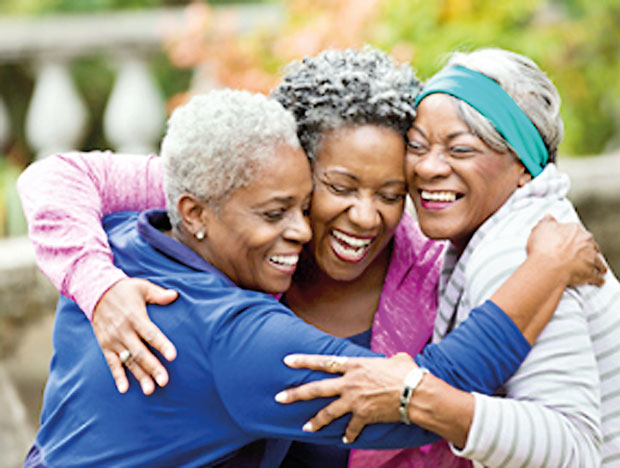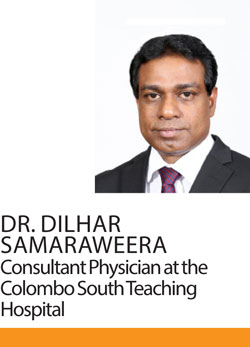Reply To:
Name - Reply Comment

 There are a few inevitable things in life. Ageing and death are at the foremost among them. Health Capsule last week highlighted the attitude change towards ageing in an effort to make readers embrace old age with enthusiasm, instead of being resigned about the inevitable.
There are a few inevitable things in life. Ageing and death are at the foremost among them. Health Capsule last week highlighted the attitude change towards ageing in an effort to make readers embrace old age with enthusiasm, instead of being resigned about the inevitable.
This week, as a continuation from last week’s article, we are discussing about the specific challenges that ageing brings and how best to overcome them and preserve the quality of life. Our resource person is Dr. Dilhar Samaraweera, Consultant Physician at the Colombo South Teaching Hospital and the President of the Sri Lanka Geriatric Association.
With regard to the problems that the elderly face, the most important factor is ‘frailty’, which can again be sub divided into Physical, Mental and Social frailty, explained Dr. Samaraweera.
Overcoming Physical Frailty
When it comes to physical frailty, most of the issues are due to the weakening of the senses with age. The most effected are hearing and vision. Deafness can be due to conduction defects from the environment to the inner ear, or due to sensory neural causes relating to the defects in the nerves.
Vision naturally decreases with age due to increased viscosity of the eye lens, which hinders the near vision in tasks such as reading. In addition, conditions like cataract and glaucoma can also affect vision. Regular checkups of the vision will present an opportunity to diagnose disease conditions early and prevent complications. The use of glasses will compensate for the loss in vision.

Mobility problems are another area of importance during advanced age. This can be due to various causes, including blood pressure changes causing dizziness and sense of imbalance, degenerative changes of the joints, reduced sensations in the feet, toes, the joints due to peripheral nerve dysfunction and atrophy or wasting away of muscles. These problems need special attention because the sequel increases during adult life. One of the problems is falling. These falls have a higher chance of resulting in uncommon and severely debilitating fractures due to reduced bone density. The most common areas for fractures are the hip and vertebral. Using of a proper walking stick with mobility at the sign of problems will help improve the quality of life. Such a tool will also act as a protective mechanism against possible fractures.
Reduced or lack of interest in nutrition value in meals during advanced age will again be harmful. The causes for this may be varied, including personal attitude (“What nutrient for me in these final years of life!”), reduction of appetite due to lessening of the senses like the taste and smell and difficulty in chewing. Having adequate energy protein, vitamins and minerals is crucial in maintaining a healthy silver age, so the elderly should take care and have a balanced nutritious meal.
It’s a common belief that the risk of developing non-communicable diseases like Diabetes, hypertension and heart diseases is more during old age. Dr. Samaraweera explained that rather than increasing the risk, diseases get accumulated with age. Each of these is a result of long term unhealthy living, which gives rise to the disease conditions after decades. So, the longer you live, the more you’ll face the consequences of the unhealthy lifestyle you led during your youth. So, each person, no matter his or her age, should be more concerned about ones’ lifestyle.
The elderly are also more susceptible to diseases like pneumonia and other infections, mainly due to the weakening of their immune system. Therefore, infectious diseases require urgent medical care than is needed in a younger person.
Constipation is also a common complaint among the elderly. This condition can be minimized by a diet with adequate fibers, physical exercise and medication when necessary.
Sexual dysfunction during old age is a problem which is often overlooked, even at the medical care profession. Inquiries should be made and the person’s quality of life should be improved through interventions.
Understanding Mental Frailty
There is a range of mental debilitations being commoner among the older age group. Dementia, or the loss of memory resulting in reduced ability to make judgments, is one such issue. It can have a variety of underlying factors like stroke, vitamin deficiencies, Diseases like Alzheimer’s and Parkinson’s, and during advanced disease, a patient may lose the ability to identify members of the family or be unable to recall his own past. This condition can be devastating to the patient and his loved ones.
Delirium is another problem, where the patient’s consciousness is clouded. This is usually the reason why some elderly patients become aggressive, violent and even go as far as attacking relations.
Depression is also commoner in the elderly, due to a variety of underlying causes like social reasons, feeling of isolation. Other psychotic conditions like mood disorders can also be present in the elderly.
Seeking appropriate treatment at the early stages will result in correcting the defects when possible and counseling for the patient and family in other cases which can go a long way towards improving the life of the patient as well as those of the family members.
Prevention of Social Isolation
Social problems may be a result of sedentary lifestyle, where the elderly parents who lived in a more rural area coming to live with children into a more urban setting. This will result in a change in the social contact as well as a feeling of isolation. At present families also have a lesser number of children and there is a higher rate of the young to immigrate. This will again result in the isolation of parents.
Death of the spouse, leaving the other to fend for himself will also result in social isolation.
Overcoming these issues will need understanding and communication. Good communication in the family and friends is the key to success in most instances. In addition, they can participate in more social activities like elderly societies, elderly day care, organize events like charity functions and concerts, which will make them a part of an active social circle. These activities will make them feel more involved and will help to get rid of the feelings of uselessness.
The young generation must understand that taking care of the very old, who are debilitated, is crucial. This will enable the feeble elderers to receive optimum care including palliative care and to be comfortable during their final days.
These changes, both in the attitudes and in society and medical care, set up to facilitate the elderly, is of utmost importance. This is because as Dr. Samaraweera explained, the percentage of elderly population in Sri Lanka has been rising. This rise is expected to continue. “Today, 12.5% of our population is over sixty years of age and this number is expected to double by 2041. We have much preparations to do as a nation, to face this challenge successfully,” he said.
The doctor ended the discussion recalling the theme for the first academic session of the Sri Lanka Geriatric Medicine Association, “Towards a Silver Age with Dignity”. If the society- the young and the old- would join hands, reaching this goal wouldn’t be difficult. This will enable us to look forwards to a happy and a fulfilling silver age.